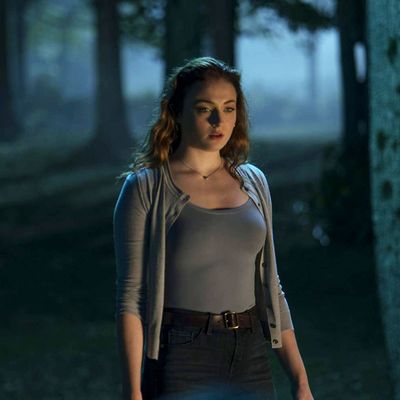
Sophie Turner, who played Sansa Stark in Game of Thrones and has the title role of Phoenix (a.k.a. Jean Grey) in the latest X-Men movie, Dark Phoenix, might be our most expressively inexpressive young actress. Under stress her features harden, her eyes become slits, and an ancient Greek war mask seems to settle over her face, from which comes a voice that both chills and cuts. (“How do you respond … Lord Baelish?”) The transformation was potent in Game of Thrones because you could discern the girl shoved into adulthood too violently; and it’s almost as effective in Dark Phoenix, which turns on an irreconcilable split — demonic rage versus human need — in Jean’s psyche. In the opening flashback, Jean’s telepathic powers cause the death of her parents (no first shot of a kid in a car with Mom and Dad ends well), but the man who adopts her — Charles Xavier (James McAvoy) — assures the little girl that those powers can be used for good. Xavier’s aims are pure; it’s his methods that prove cataclysmic. Jean is induced to repress her trauma instead of working through it, which becomes a big problem when she’s zapped by a cosmic space whatsit that melts the partitions in her brain. After which, look out.
Like most good superhero movies, Dark Phoenix operates on two levels, comic-book fantastical and psychological. Like most not-so-good ones, it doesn’t do justice to either aspect. The results here are middling, but the director, Simon Kinberg, throws a lot of ideas at you. It’s not boring. This is a real Zeitgeist superhero picture, with a nod toward militant female empowerment and the concomitant notion that fathers don’t know best — and therefore have no right to make decisions on behalf of women. Also, it’s cool to see our earthbound X-Men fight space invaders.
The note most often hit is “Bad Xavier!” — a scolding that would be more satisfying if the crisply patriarchal Patrick Stewart sill played the role instead of the mild and relatively boyish McAvoy. Everyone has it in for poor Charles. In this new timeline, the X-Men have been welcomed into the world of ordinary mortals, to the point where Xavier has a special phone to reach the U.S. president, but Raven (Jennifer Lawrence) thinks celebrity has gone to his head. When Charles dispatches a team to save a space shuttle beleaguered by said cosmic space whatsit, Raven tells him, “If anything goes wrong, I’ll turn us around in a heartbeat.” When did she become such a stick-in-the-mud? Much as I adore J.Law, I miss the other timeline with Rebecca Romijn’s gleeful Mystique.
That floating whatsit arrives with a bunch of ET’s in pursuit, survivors of a dead world who are looking for a new one. They are not so nice. The leader, Vuk, shape-shifts into Jessica Chastain with white-blonde (it looks irradiated) hair and an instant mastery of the vocabulary of feminist resentment. Eager to get access to Jean’s newfound abilities, she suggests to the confused young woman that men resent her power. “Are you a scared little girl who answers to a man in a chair or are you the most powerful being on the planet?” she asks, rhetorically. Vuk is spot-on, of course, but given that her intentions are nefarious, the effect is similar to Glenn Close’s Alex employing the language of women’s lib to justify boiling a child’s rabbit. Jean is being played.
Some of the new X-Men are dull in comparison to their predecessors, but Hank/Beast (Nicholas Hoult) has a beefier, more emotionally engaged presence and Evan Peters’s Quicksilver looks endearingly like Max from Where the Wild Things dipped in purple dye. (I love that droopy tail.) Michael Fassbender’s Erik/Magneto has detached the chip from his shoulder and here functions as an unusually surly action hero: In a very peculiar sequence, Jean flies (sans plane) to his hidden compound to ask for advice on self-control. Their conversation ends with a fun, telepathic tug-of-war over a helicopter, but the other action scenes aren’t easy to follow — they play as if the storyboards were laid out randomly. There is, however, one marvelous frame in which the characters move at several different speeds, each superhero (or human) in his or her own temporal dimension.
Xavier and his team don’t know how to handle space entities, whose minds he can’t read and whose powers seem elastic (to me, too — I never figured out what they could and couldn’t do). But it’s great to see Chastain reveling in her character’s villainy — high, as they say, on the hog. Kinberg conjures up some good, horror-movie images that are enhanced by Hans Zimmer’s score, which adds percussive, otherworldly sounds to the usual orchestral bombast. And above it all floats Turner, whose face is good to watch even when nothing seems to be happening on it.
I’d be remiss if I didn’t address the serious element of Dark Phoenix, which is what to do with trauma. The neuroscience of PTSD seems to evolve every year, with Freudian therapy yielding to behavior modification and now to such neurophysiological techniques as EMDR, in which one supposedly relives past traumas with corresponding eye movements. So, here we see that Charles’s preferred technique — repression — doesn’t work in the long term, while an injection of primordial energy compelling the patient to blow stuff up makes things even hairier. There’s a suggestion at the end of Dark Phoenix that Charles will move on to other, more down-to-earth pursuits, but given his mind-reading abilities, he could be without peer in the realm of guided meditation. I’m not being wholly facetious — it’s fascinating to extrapolate. To what better use can we put this plague of superhero movies than helping us find workable metaphors for treating what ails us?


